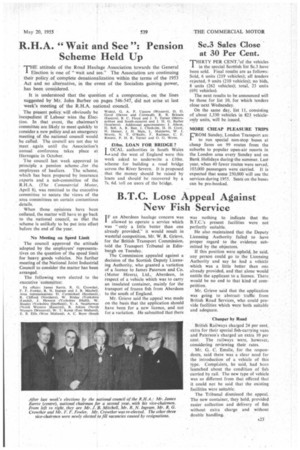B.T.C. Lose Appeal Against New Fish Service IF an Aberdeen haulage concern was
Page 25

If you've noticed an error in this article please click here to report it so we can fix it.
allowed to operate a service which was " only a little better than one already provided," it would result in wasteful competition, Mr. W. R. Grieve, for the British Transport Commission, told the Transport Tribunal in Edinburgh on Tuesday.
The Commission appealed against a decision of the Scottish Deputy Licensing Authority, who granted a variation of a licence to James Paterson and Co. (Motor Hirers), Ltd., Aberdeen, in respect of a vehicle which was to carry an insulated container, mainly for the transport of frozen fish from Aberdeen to the south of England.
Mr. Grieve said the appeal was made on the basis that the application should have been for a new licence, and not for a variation. He submitted that there was nothing to indicate that the B.T.C.'s present facilities were not perfectly suitable.
He also maintained that the Deputy Licensing Authority failed to have proper regard to the evidence submitted by the objectors.
If this position were upheld, he said, any person could go to the Licensing Authority and say he had a vehicle which was a little better than one already provided, and that alone would entitle the applicant to a licence. There would be no end to that kind of competition.
Mr. Grieve said that the application was going to abstract traffic from British Road Services, who could provide facilities which were both suitable and adequate.
Cheaper by Road British Railways charged 24 per cent. extra for their special fish-carrying vans and Paterson's charged an extra 10 per cent. The railways were, however, considering reviewing their rates.
Mr. G. C. Ernslie, for the respondents, said there was a clear need for the introduction of a vehicle of this type. Complaints, he said, had been launched about the condition of fish carried by rail. The new type of vehicle was so different from that offered that it could not be said that the existing facilities were suitable.
The Tribunal dismissed the appeal. The new container, they held, provided easier collection and delivery of fish without extra charge and without double handling.




















































































